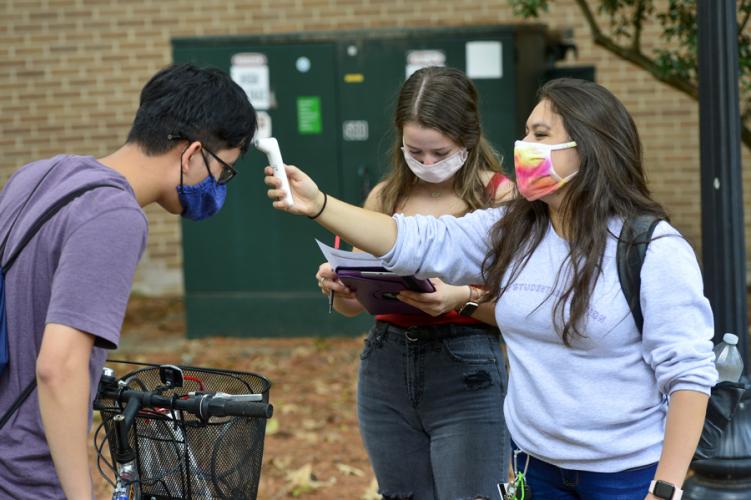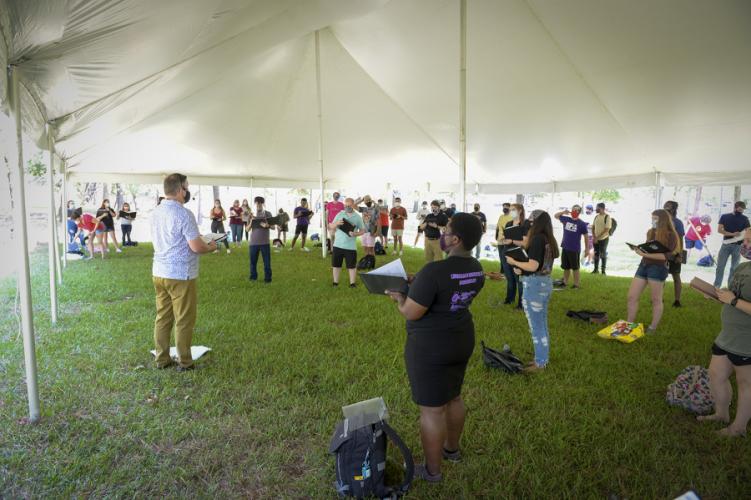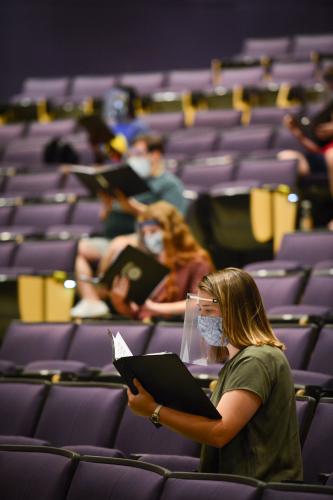NACOGDOCHES, Texas – Vocal instruction in the COVID-19 world has taken on a new look, and choral instructors and voice students at Stephen F. Austin State University are following the newest guidelines that have emerged from scientific studies worldwide.
Over the summer, the SFA School of Music voice faculty closely monitored emerging studies and best practices from all over the world, according to Dr. Michael Murphy, director of choral activities at SFA. In late July, the results of a long-awaited study – Reducing Bioaerosol Emissions and Exposure in the Performing Arts: A Scientific Roadmap for a Safe Return from COVID19 – were made public.
“The results from that study gave us a blueprint in producing safety protocols for both faculty and students,” Murphy said.
Students are being asked to take their temperature before leaving their residences each morning. Students will wear appropriate Centers for Disease Control and Prevention-approved face masks when arriving on campus as well as in the voice studio and rehearsal rooms, Murphy said. For ensembles like a Cappella Choir and Chamber Singers, each student’s temperature is taken again before rehearsal begins.
Faculty studios and rehearsal spaces have been reorganized to follow the recommended 6-to-10-foot distance. High touch surfaces are sanitized regularly. All teaching studios are equipped with HEPA filter air purifiers, and each large space will be regularly sanitized with room sanitizing foggers. Indoor rehearsals will stop after 30 minutes to allow for one-to-three air changes, and outdoor rehearsals will stop at 30-minute intervals for a five-minute period for aerosols to disperse.
The A Cappella Choir and Chamber Singers collaborated with Dr. Dan Bruton, professor in the Department of Physics and Astronomy, who made face shields for each singer to wear in addition to their face masks when indoors, Murphy said.
“For students, a variety of delivery modes are being used for instruction, including face to face, hybrid and utilizing Zoom,” Murphy said. “The greatest challenge in music is not to lose the community and connectedness that is inherent when studying the arts.”
Murphy thanked the College of Fine Arts and School of Music, along with SFA President Dr. Scott Gordon and his leadership, for providing large tents for outdoor rehearsals.
The music-making at SFA will not stop, but live musical performances open to the public – with the exception of singular student recitals with limited audience seating – have been put on hold for the time being.
“Ensemble performances will be live streamed without an audience,” Murphy said. “For vocalists who are giving their recitals, only family and voice faculty will be in attendance. Most students are planning to live-stream their concerts and recitals to allow for more friends and family to take part in these great accomplishments.”
Live streaming can be accessed free of charge at the School of Music website at music.sfasu.edu.
 Axe ’Em, Jacks!
Axe ’Em, Jacks!


